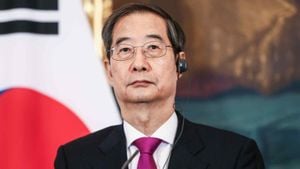President-elect Donald Trump's threats to impose tariffs on Mexico, Canada, and China have set off alarms throughout North America’s economic framework. His proposal to apply a 25% tariff on imports from Canada and Mexico, framed as necessary to combat drug trafficking and illegal immigration, could not only reshape trade relationships but also disadvantage American consumers and businesses relying on cross-border trade.
Trump's rhetoric paints tariffs as tools for securing the U.S. borders and controlling the flow of undocumented migrants. He recently posted on Truth Social, emphasizing the need for "strong efforts" from Mexico and Canada, asserting, "thousands of people are pouring through, bringing crime and drugs at levels never seen before." This framing positions trade negotiations as linked intrinsically with national security, pushing countries to align their policies with U.S. interests under the threat of economic penalties.
But what does this mean for the broader economy? Concerns are mounting among U.S. businesses and industries, particularly those dependent on imported goods. For example, the American oil and gas sectors are facing potential disruptions from these tariff threats. A significant number of oil-related imports from Canada are at risk, which could force refiners to seek alternative crude supplies, thereby spiking prices domestically.
According to reports from the Petroleum Economist, the proposed tariffs could upend oil flows between the U.S. and its North American neighbors, creating ripple effects across the fuel supply chain. Export-oriented refiners worry about losing access to stable and competitively priced crude oil, particularly since Canada is America's largest foreign supplier of oil. Subsequent price increases could affect consumers at the pump and contribute to inflationary pressures already troubling the economy.
The specter of trade wars looms larger with these tariff threats, reminding many of the tensions and backlash experienced during the previous Trump administration. Farmers, especially those from California, are bracing for adverse impacts. They could be caught directly in the crossfire of retaliatory tariffs from China, where many key agricultural products—including almonds, dairy, and pistachios—face significant tariff hikes.
Research from the University of California, Davis indicates drastic revenue losses for California's agricultural sector. The potential scenario of retaliatory tariffs by China poses risks to California farmers who depend heavily on exports to this market. The projections show losses reaching as much as $6 billion annually, with Fresno County alone risking nearly $1 billion.
For the San Joaquin Valley, which has enjoyed substantial revenues from agricultural exports, these potential losses raise serious concerns. Many local farmers supported Trump based on his promises to address issues affecting their industries, such as water access and regulatory relief. Yet, the paradox of increasing tariffs could lead to the very damage their businesses can ill afford. "If the worst of the proposed tariffs go through, it could decimate our primary exports and hurt jobs tied to these industries," warned one local farmer.
Strategically, Trump’s focus on tariffs isn’t confined to just economic concerns; it has readily blended with his political narratives. He frames American trade as being victimized by foreign governments. By attacking long-standing trade agreements like the USMCA, which replaced NAFTA, he’s appealing to his voter base, many of whom feel underserved by traditional trade policies.
Yet, as the countdown to the inauguration progresses, business leaders are urging caution. Industry players worry not just about immediate economic fallout; they fear the long-term perception of America as an unstable trade partner could dissuade future international investments. The Los Angeles Times reported on industry representatives calling for diplomacy over tariffs, stressing how interconnected global economies have become and how tariffs threaten to unravel those relationships.
Even with widespread unease, prominent agricultural voices remain hopeful about potential negotiations. They advocate for more targeted tariffs instead of broad strokes, believing carefully crafted regulations could protect American farmers without inviting retaliation.
"Targeted approaches should be the way forward," noted agricultural economist Colin Carter. "We need to be strategic and avoid just throwing up barriers. Our industries thrive on international markets, and we cannot afford to isolate ourselves without considering the risks hurting our economy.”
Politically, the maneuvering results not just from Trump’s threats but also the shifting dynamics within Congress. Attempts to push back against protectionism face varying levels of support from both parties, especially as elections loom. Regional representatives from farming states face indoor conflicts, balancing loyalty to Trump with the need to protect constituents from potential trade fallout.
Mexico and Canada have expressed strong opposition to Trump’s tariff proposals, emphasizing the importance of cross-border cooperation for regional economic stability. According to Mexican officials, such tariffs would undermine shared efforts to combat challenges like drug trafficking. They argue for collaborative dialogue rather than economic penalties to address these issues effectively.
Despite these severe ramifications, supporters of the tariffs maintain the stance of pursuing stronger border policies as necessary for America's long-term security and economic health. Trump’s electoral support base supplies corporate financial backing, bolstering his agenda as he prepares to take office. Political analysts observe this dynamic closely, noting how Trump's decisions after inauguration will ripple across various industries and geographies.
Conclusively, the emergence of tariffs as political weapons signifies more than just economic calculations but taps deeply onto national narrative and borders. While Trump rallies support by presenting himself as the negotiator willing to rethink trade, the repercussions of such aggressive posturing remain uncertain. Whether this strategy resonates positively with voters or backfires due to economic realities remains to be seen.
Negotiators on all sides are gearing up for challenging conversations as Trump’s presidency looms large over the international trade stage. For now, caution persists among farmers, consumers, and businesses alike, all awaiting to see how this tangled web of tariffs will untangle.



